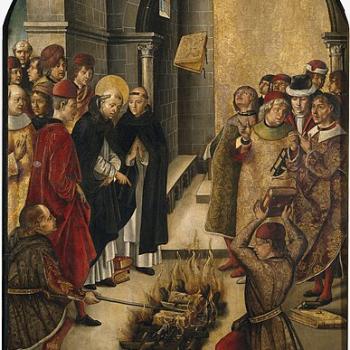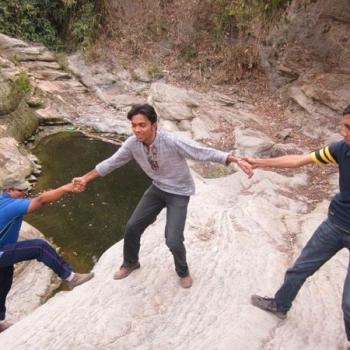The Hebrew word for a ritual bath is mikvah, the root of which is the word kaveh, meaning hope.
Hope always implies change. It is for a change in a situation that a person "hopes." In particular, hope is sensed most strongly when a person finds himself in a desperate situation, when he has hit "rock-bottom." At that lowest point, when there is no other choice, a person yearns for the opportunity to start over. This is what the mikvah is all about.
The idea of the mikvah is to step into and be encompassed by a "world of water," which is most comparable to the world of water each of us resided in before we were born—the womb. In the womb, a fetus is essentially a part of its mother, not yet an "other" entity. Thus, in the world of water that is the womb, the fetus is included within, and as an aspect of, its mother. In this sense, the fetus' essential identity is as part of its mother, rather than as something other than its mother.
(In fact, according to Jewish law, if a pregnant non-Jew converts to Judaism, when that baby is born it does not need to be converted but is already considered Jewish at birth, since it is considered to have been included as part of its mother; as if it is a "limb" of its mother.)
The more a person sees himself as "other" than the greater context of which he is a part, the more he disconnects himself from his "higher" self and manifests his ego. For example, imagine there was a completed jigsaw puzzle on the table in front of you. Now, imagine one of the pieces of that puzzle standing up and saying, "I've had it with being part of this jigsaw puzzle! I wanna do my own thing. I'm outta here!"
At that moment, this puzzle piece is manifesting his ego. He is viewing himself as something "other" than the puzzle. But the truth is that by identifying himself as something other than the puzzle he loses the "higher," all-inclusive identity of the entire puzzle of which he is a part. After all, what is a puzzle piece without the rest of the puzzle? So, soon after the puzzle piece has left the puzzle, he starts to have an identity crisis, wondering who he really is and what his purpose is all about. A few minutes later, when someone looks at him the wrong way, he starts to ponder, "Why is that guy looking at me funny? Is there something wrong with the way I'm cut?" He gets self-conscious and develops self-esteem issues. When you remove yourself from your essential bigger picture in order to capture the fraudulent fleeting illusory notion of independence and otherness, the result is the replacement of your "higher" intrinsic worth with your "lower" exterior quasi-identity.
Similarly, when a human being, whose essence is to be an indispensible aspect of the Infinite, psychologically removes himself from that bigger picture in favor of the fraudulent fleeting illusory notion that he is independent and "other" than God, the result is the replacement of his Essential Identity with his ego. And once he identifies with his ego, he becomes arrogant and that makes way for the possibility of insecurity since he has denied the reality of his "higher" intrinsic worth.
Nullification
The mikvah is the remedy for this "downward" spiral, which we all take part in at one level or another. As mentioned, the mikvah experience is a recreation of the womb experience. That is, just as the Essential Identity of the fetus is found in its inclusion within, and as an aspect of, the mother, so too, the mikvah experience reveals that our Essential Identity is found in our inclusion within, and as an aspect of, the Mother, i.e., God.
This conscious alignment of one's identity with one's Essential Identity is the extension of one's identity beyond the tangible side of the self. This is similar to the manner in which the puzzle piece would identify himself as an aspect of the puzzle rather than something "other" than the puzzle, in order to extend his identity beyond the more tangible fragmented piece-side of himself to be incorporated into the less tangible but more holistic puzzle-side of himself.
In Kabbalah, this inclusion and incorporation of one's "lower" self into one's "higher" self by way of rising above the inkling to focus and identify as something independent and other than God is referred to in Kabbalah as 'Nullification'.
By Nullification, we do not mean that the person is making himself into nothing. On the contrary, it implies he is so much more than merely a thing. Just as the fetus' sense of otherness is "nullified" as it experiences itself as so much more than its self, as a part of its mother, so too, immersion in a mikvah is the nullification of one's sense of otherness as one experiences himself as so much more than himself—as a part of his Mother.
That is, a person normally walks around with a sense of self that ends where his body ends, thereby defining himself in accordance with his "Body Identity." The mikvah experience gets to a grander sense of self that expands beyond the limits of the body to incorporate and include oneself as an aspect of the Infinite, thereby defining oneself in accordance with his "Soul Identity." Thus, the mikvah experience is the nullification of one's sense of Otherness (Body Identity) to one's Essential Identity (Soul Identity).





